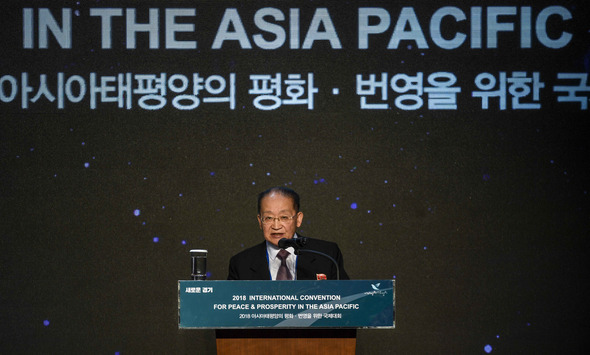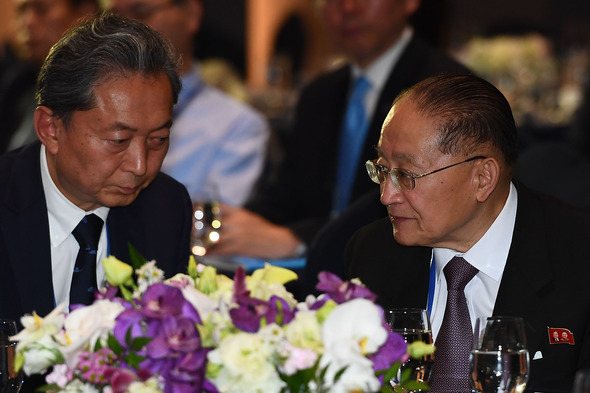 |
|
Ri Jong-hyok, vice chairman of North Korea’s Asia-Pacific Peace Committee, gives a speech during an international forum on peace and prosperity in the Asia-Pacific region in Goyang, Gyeonggi Province, on Nov. 16. (photo pool)
|
N. Korean delegation attends S. Korean event denouncing Japan’s past for first time
“No future awaits a people that forgets its history. South and North Korea should work in concert to ferret out Japan’s crimes and to ensure that such an unhappy history never again befalls generations to come,” said Ri Jong-hyok, vice chairman of North Korea’s Asia-Pacific Peace Committee, on Nov. 16. Ri was visiting South Korea to attend an international forum on peace and prosperity in the Asia-Pacific region, co-organized by Gyeonggi Province and the Asia-Pacific Exchange Association. During this event, which was held on Friday at the MVL Hotel in Goyang, Gyeonggi Province, participants from South Korea, North Korea and Japan adopted a five-point joint declaration that called for setting up peace parks and monuments commemorating the victims of compulsory mobilization in a manner suitable to each country’s circumstances, recovering the remains of the victims, carrying out fact-finding investigations and establishing joint foundations. This was the first time that a North Korean delegation attended an event held in South Korea to denounce war crimes, including Japan’s conscription of Koreans for forced labor, and to seek a joint response. “What Japan did to the Korean people was a vicious crime of genocide that surpassed the crimes that the Germans committed against the Jews in World War II, but even today, seventy years after Japan’s defeat in the war, the Japanese authorities resist even recognizing what occurred, let alone making an apology or providing compensation. The Japanese government needs to directly investigate the crimes of compulsory mobilization and abduction, to disclose the whole truth and to apologize and provide compensation to the bereaved families,” Ri said. Ri proposes Japanese government take concrete steps to address past war crimes Ri proposed that the Japanese government undertake the following tasks to address its history of compulsory mobilization and abduction of Koreans: investigate the facts of the compulsory mobilization and abduction and make them all public, acknowledge its national responsibility for the compulsory mobilization and abduction of Koreans, make an official apology and provide compensation to the victims and the family members of the deceased, take practical steps to recover and repatriate the remains of all those who died after being forcibly mobilized or abducted. During a keynote address following Ri’s speech, Yukio Hatoyama, former Japanese prime minister, said, “The Abe administration says that it has to put pressure [on North Korea] first on the abduction [of Japanese by North Korea] and then on the nuclear and missile issues, but I have a different take on this. Japan ought to begin by normalizing diplomatic relations with North Korea and then look for solutions to a range of issues, including the abduction issue.” “It’s a historical fact that the Korean Peninsula was divided as a result of Japan colonizing the Korean Peninsula and later entering World War II, and it can’t be denied that Japan is greatly responsible for this. Japan needs to soberly accept such historical facts and take unlimited responsibility. It needs to continue apologizing until the people who have been harmed by war extend their forgiveness and say that Japan doesn’t need to apologize anymore,” Hatoyama said. Concerns of US reverting to the “Libya method” In the next keynote lecture titled “Ways to Overcome Challenges in the Process of Resolving the North Korean Nuclear Issue,” former South Korean Unification Minister Jeong Se-hyun voiced concerns about changes in American policy. “When the question of implementing the nuclear agreement reached in Singapore on June 12 by the leaders of North Korea and the US passed into the hands of low-level bureaucrats in the US, they reverted to the conventions of the past 25 years, namely demanding that North Korea take the first steps,” Jeong said. “If the US’ recently formulated policy on North Korean nuclear weapons is that North Korea can be rewarded after it submits a nuclear inventory and allows inspections and verification, I’m concerned that the Trump administration is attempting to return to the ‘Libya method,’ which was the Bush administration’s method of resolving the North Korean nuclear issue.” Jeong explained that Libyan leader Muammar el-Qaddafi voluntarily denuclearized in 2003 on the belief that the US was acting in good faith and even established diplomatic relations with the US in 2006, only to come to a horrible end in 2011. Since that time, Jeong said, North Korea has been stoutly opposed to denuclearizing without any corresponding measures. “In order to alleviate North Korea’s anxiety and resistance, the countries around the Korean Peninsula need to create a system for promoting and monitoring North Korea’s denuclearization, consisting of both a two-party component (North Korea and the US) and a four-party component (South Korea, China, Russia and the US), in order to assure that the US doesn’t unilaterally threaten the safety of the North Korean regime after it moves to denuclearize,” Jeong suggested.
 |
|
Former Japanese Prime Minister Yukio Hatoyama, former Japanese prime minister, and Ri Jong-hyok, vice chairman of North Korea’s Asia-Pacific Peace Committee, converse at an international forum on peace and prosperity in the Asia-Pacific region in Goyang, Gyeonggi Province, on Nov. 16. (photo pool)
|






